Public views are tied to how these technologies would be used, what constraints would be in place
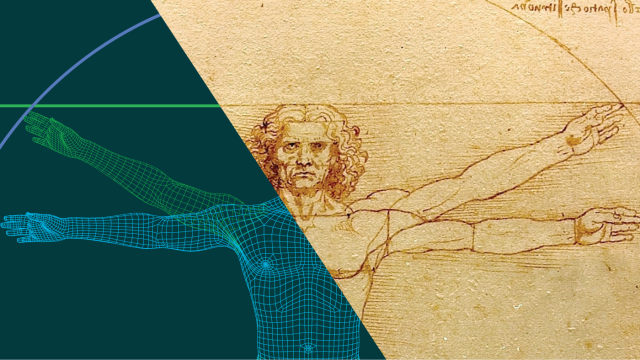
Pew Research Center conducted this study to understand Americans’ views about artificial intelligence and human enhancement technologies. For this analysis, we surveyed 10,260 U.S. adults from Nov. 1 to 7, 2021.
Everyone who took part in the survey is a member of the Center’s American Trends Panel (ATP), an online survey panel that is recruited through national, random sampling of residential addresses. This way, nearly all U.S. adults have a chance of selection. The survey is weighted to be representative of the U.S. adult population by gender, race, ethnicity, partisan affiliation, education and other categories. Read more about the ATP’s methodology.
Here are the questions used for this report, along with responses, and its methodology.
Developments in artificial intelligence and human enhancement technologies have the potential to remake American society in the coming decades. A new Pew Research Center survey finds that Americans see promise in the ways these technologies could improve daily life and human abilities. Yet public views are also defined by the context of how these technologies would be used, what constraints would be in place and who would stand to benefit – or lose – if these advances become widespread.
Fundamentally, caution runs through public views of artificial intelligence (AI) and human enhancement applications, often centered around concerns about autonomy, unintended consequences and the amount of change these developments might mean for humans and society. People think economic disparities might worsen as some advances emerge and that technologies, like facial recognition software, could lead to more surveillance of Black or Hispanic Americans.
This survey looks at a broad arc of scientific and technological developments – some in use now, some still emerging. It concentrates on public views about six developments that are widely discussed among futurists, ethicists and policy advocates. Three are part of the burgeoning array of AI applications: the use of facial recognition technology by police, the use of algorithms by social media companies to find false information on their sites and the development of driverless passenger vehicles.
The other three, often described as types of human enhancements, revolve around developments tied to the convergence of AI, biotechnology, nanotechnology and other fields. They raise the possibility of dramatic changes to human abilities in the future: computer chip implants in the brain to advance people’s cognitive skills, gene editing to greatly reduce a baby’s risk of developing serious diseases or health conditions, and robotic exoskeletons with a built-in AI system to greatly increase strength for lifting in manual labor jobs.
The current report builds on previous Pew Research Center analyses of attitudes about emerging scientific and technological developments and their implications for society, including opinion about animal genetic engineering and the potential to “enhance” human abilities through biomedical interventions, as well as views about automation and computer algorithms.
As Americans make judgments about the potential impact of AI and human enhancement applications, their views are varied and, for portions of the public, infused with uncertainty.
Americans are far more positive than negative about the widespread use of facial recognition technology by police to monitor crowds and look for people who may have committed a crime: 46% of U.S. adults think this would be a good idea for society, while 27% think this would be a bad idea and another 27% are unsure.
By narrower margins, more describe the use of computer algorithms by social media companies to find false information on their sites as a good rather than bad idea for society (38% vs. 31%), and the pattern is similar for the use of robotic exoskeletons with a built-in AI system to increase strength for manual labor jobs (33% vs. 24%).
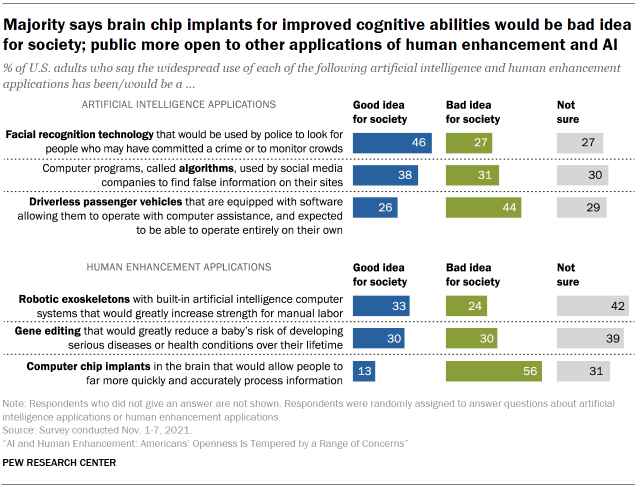
By contrast, the public is much more cautious about a future with widespread use of computer chip implants in the brain to allow people to far more quickly and accurately process information: 56% say this would be a bad idea for society, while just 13% think this would be a good idea. And when it comes to the much-discussed possibility of a future with autonomous passenger vehicles in widespread use, more Americans say this would be a bad idea (44%) than a good idea (26%).
Still, uncertainty is among the themes seen in emerging public views of AI and human enhancement applications. For instance, 42% are not sure how the widespread use of robotic exoskeletons in manual labor jobs would impact society. Similarly, 39% say they are not sure about the potential implications for society if gene editing is widely used to change the DNA of embryos to greatly reduce a baby’s risk of developing serious diseases or health conditions over their lifetime.
Ambivalence is another theme in the survey data: 45% say they are equally excited and concerned about the increased use of AI programs in daily life, compared with 37% who say they are more concerned than excited and 18% who say they are more excited than concerned.
A survey respondent summed up his excitement about the increased use of artificial intelligence in an open-ended question by saying:
“AI can help slingshot us into the future. It gives us the ability to focus on more complex issues and use the computing power of AI to solve world issues faster. AI should be used to help improve society as a whole if used correctly. This only works if we use it for the greater good and not for greed and power. AI is a tool, but it all depends on how this tool will be used.” – Man, 30s
Another respondent explained her ethical concerns about the increased use of AI this way:
“It’s just not normal. It’s removing the human race from doing the things that we should be doing. It’s scary because I’ve read from scientists that in the near future, robots can end up making decisions that we have no control over. I don’t like it at all.” – Woman, 60s
It is important to note that views on these specific applications do not constitute the full scope of opinions about the growing number of uses of AI and the proliferating possible advances being contemplated to boost human abilities.
The survey was built around six vignettes, to root opinion in a specific context and allow for a deeper exploration of views. Thus, our questions about public attitudes about facial recognition technology are not intended to cover all possible uses but, instead, to measure opinions about its use by police. Similarly, we concentrated our exploration of brain chip implants on their potential to allow people to far more efficiently process information rather than on the use of brain implants to address therapeutic needs, such as helping people with spinal cord injuries restore movement.
The survey findings underscore how public opinion is often contingent on the goals and circumstances around the uses of AI and human enhancement technologies. For example, in addition to exploring views about the use of facial recognition by police in depth, the survey also sought opinions about several other possible uses of facial recognition technology. It shows that more U.S. adults oppose than favor the idea of social media sites using facial recognition to automatically identify people in photos (57% vs. 19%) and more oppose than favor the idea that companies might use facial recognition to automatically track the attendance of their employees (48% vs. 30%).
Some of the key themes in the survey of 10,260 U.S. adults, conducted in early November 2021:
A new era is emerging that Americans believe should have higher standards for assessing the safety of emerging technologies. The survey sought public views about how to ensure the safety and effectiveness of the four technologies still in development and not widely used today. Across the set, there is strong support for the idea that higher standards should be applied, rather than the standards that are currently the norm. For instance, 87% of Americans say that higher standards for testing driverless cars should be in place, rather than using existing standards for passenger cars. And 83% believe the testing of brain chip implants should meet a higher standard than is currently in use to test medical devices. Eight-in-ten Americans say that the testing regime for gene editing to greatly reduce a baby’s risk of serious diseases should be higher than that currently applied to testing medical treatments; 72% think the testing of robotic exoskeletons for manual labor should use higher standards than those currently applied to workplace equipment.
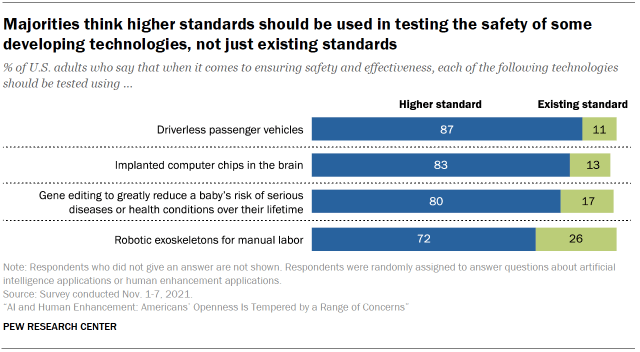
Sharp partisan divisions anchor people’s views about possible government regulation of these new and developing technologies. As people think about possible government regulation of these six scientific and technological developments, which prospect gives them more concern: that government will go too far or not far enough in regulating their use?
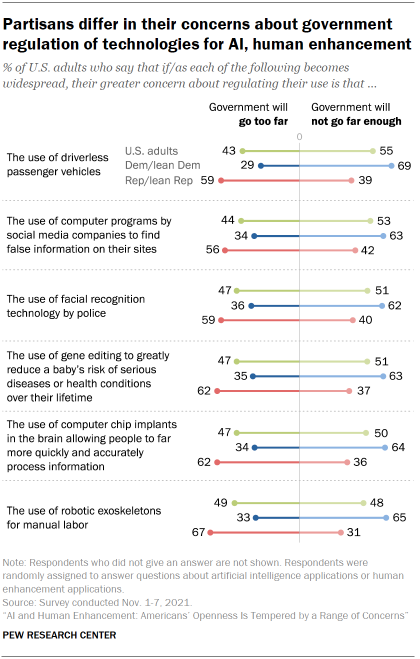
Majorities of Republicans and independents who lean to the Republican Party say they are more concerned about government overreach, while majorities of Democrats and Democratic leaners worry more that there will be too little oversight.
For example, Republicans are more likely than Democrats to say their greater concern is that the government will go too far regulating of the use of robotic exoskeletons for manual labor (67% vs. 33%). Conversely, Democrats are more likely than Republicans say their concern is that government regulation will not go far enough.
People are relatively open to the idea that a variety of actors – in addition to the federal government – should have a role in setting the standards for how these technologies should be regulated. Across all six applications, majorities believe that federal government agencies, the creators of the different AI systems and human enhancement technologies and end users should play at least a minor role in setting standards.
Less than half of the public believes these technologies would improve things over the current situation. One factor tied to public views of human enhancement is whether people think these developments would make life better than it is now, or whether reliance on AI would improve on human judgment or performance. On these questions, less than half of the public is convinced improvements would result.
For example, 32% of Americans think that robotic exoskeletons with built-in AI systems to increase strength for manual labor would generally lead to improved working conditions. However, 36% think their use would not make much difference and 31% say they would make working conditions worse.
In thinking about a future with widespread use of driverless cars, 39% believe the number of people killed or injured in such accidents would go down. But 27% think the number killed or injured would go up; 31% say there would be little effect on traffic fatalities or injuries.
Similarly, 34% think the widespread use of facial recognition by police would make policing more fair; 40% think that it would not make much difference, and 25% think it would make policing less fair.
Another concern for Americans ties to the potential impact of these emerging technologies on social equity. People are far more likely to say the widespread use of several of these technologies would increase rather than decrease the gap between higher- and lower-income Americans. For instance, 57% say the widespread use of brain chips for enhanced cognitive function would increase the gap between higher- and lower-income Americans; just 10% say it would decrease the gap. There are similar patterns in views about the widespread use of driverless cars and gene editing for babies to greatly reduce the risk of serious disease during their lifetime.
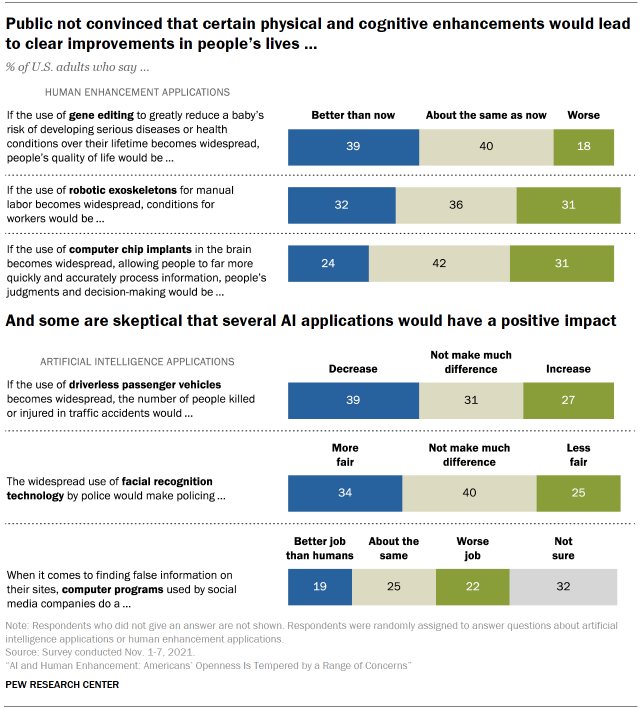
Even for far-reaching applications, such as the widespread use of driverless cars and brain chip implants, there are mitigating steps people say would make them more acceptable. A desire to retain the ability to shape their own destinies is a theme seen in public views across AI and human enhancement technologies. For even the most advanced technologies, there are mitigating steps – some of which address the issue of autonomy – that Americans say would make the use of these technologies more acceptable.
Seven-in-ten Americans say they would find driverless cars more acceptable if there was a requirement that such cars were labeled as driverless so they could be easily identified on the road, and 67% would find driverless cars more acceptable if these cars were required to travel in dedicated lanes. In addition, 57% say their use would be more acceptable if a licensed driver was required to be in the vehicle.
Similarly, about six-in-ten Americans think the use of computer chip implants in the brain would be more acceptable if people could turn on and off the effects, and 53% would find the brain implants more acceptable if the computer chips could be put in place without surgery.
About half or more also see mitigating steps that would make the use of robotic exoskeletons, facial recognition technology by police and gene editing in babies to greatly reduce the risk of serious disease during their lifetime more acceptable.
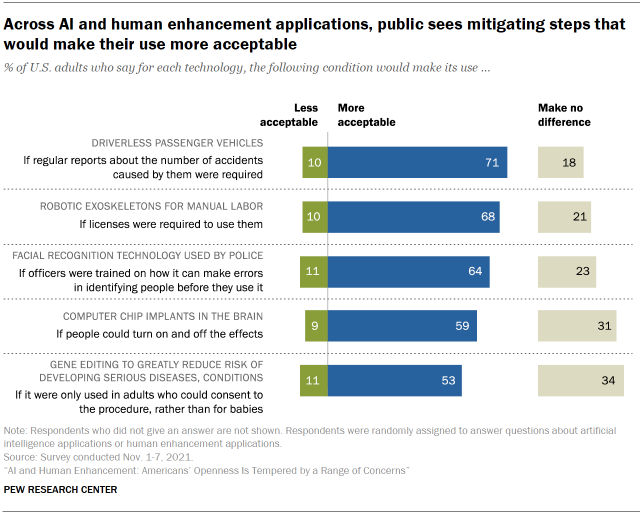
A map to this report
The chapters that follow cover a broad terrain.
How Americans think about artificial intelligence: Chapter 1 looks at people’s views about the increasing use of AI in everyday life and summarizes their written responses to an open-ended question about their concerns and excitement. It identifies some of the potential uses of AI that prompt more excitement than concern from the public – for instance, AI systems that can help with household chores. And it highlights some applications that would concern the public, including the potential of AI programs to know people’s thoughts and behaviors or make important life decisions for people. The chapter also looks at the common themes and demographic differences in how Americans think about the three specific contexts for AI in the survey.
Public more likely to see facial recognition use by police as good, rather than bad for society: Some 21% of Americans say they have heard or read a lot about this use of technology, 58% have heard a little and 20% have heard nothing at all. A plurality (46%) believe it is a good idea for society. Still, a 57% majority say that if widespread use of facial recognition by police occurs, crime would stay about the same. And 66% say police definitely or probably would use facial recognition to monitor Black and Hispanic neighborhoods much more often than other neighborhoods.
Mixed views about social media companies using algorithms to find false information: About a quarter (24%) of Americans have heard or read a lot about this, 51% have heard a little and 24% have heard nothing at all. Many social media users have seen information on these sites that has been flagged or labeled as false. Seven-in-ten think the widespread use of algorithms to find false information is leading to censorship of political viewpoints, and 69% say it’s leading to news and information being wrongly removed from the sites.
Americans cautious about the deployment of driverless cars: About a quarter of U.S. adults (26%) have heard a lot about driverless cars, compared with 62% who have heard a little and 12% who have heard nothing at all. Some 45% would be not too or not at all comfortable sharing the road with them, and more say they would not want to ride in a driverless vehicle themselves than say they would want to do this (63% vs. 37%).
What Americans think about possibilities ahead for human enhancement: Chapter 5 looks at how people anticipate a future where scientific and technological advances could bring fundamental shifts in human abilities. Americans are more enthusiastic about possibilities that could bring therapeutic benefits to people, such as by allowing increased movement for people who are paralyzed. There is generally far less enthusiasm for using these technologies to enhance human abilities in ways that don’t address a clear need. Across possible uses, men are generally more supportive of potential changes to human abilities than women. Those with higher levels of religious commitment often express concern and are more likely to see such changes as meddling with nature, compared with those who have lower levels of religious commitment.
Public cautious about enhancing cognitive function using computer chip implants in the brain: A 62% majority foresees potential benefits for job productivity from brain chip implants for far faster and more accurate information processing. But most Americans (78%) say they, personally, would not want a brain chip implant if it were available. And 63% say widespread use of brain chips for cognitive enhancement would be meddling with nature and crossing a line we should not cross; far fewer (35%) say this would be in keeping with other ways humans have tried to better themselves over time.
Americans are closely divided over editing a baby’s genes to reduce serious health risk: On a personal level, about half of Americans say they would want gene editing for their own baby to greatly reduce the baby’s risks of developing serious disease or health conditions, while roughly the same share say they would not want this (48% to 49%). At the same time, a majority (73%) thinks most parents would feel pressure to get this for their baby if the use of this technology becomes widespread.
Mixed views about a future with widespread use of robotic exoskeletons to increase strength for manual labor jobs: Americans anticipate both benefits and downsides for workers from the possibility of widespread use of robotic exoskeletons with a built-in AI system to increase strength for manual labor jobs such as manufacturing or construction. About two-thirds (65%) see the potential for a wider array of people to fill such jobs, and 70% think the use of robotic exoskeletons would help prevent injuries on the job. At the same time, large majorities see this development as leading to worker layoffs (81%) and anticipate loss of strength for workers who rely on these devices (73%).




